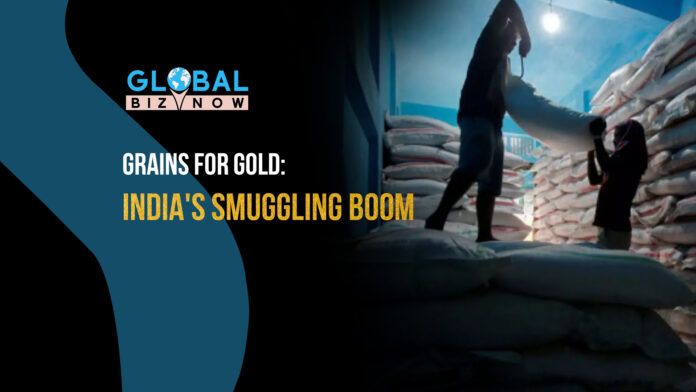In the shadow corridors of trade, a fascinating economic phenomenon has emerged, quietly, between India and Bangladesh: barter smuggling. As India continues imposing export curbs on staples including rice, wheat, and sugar, an underground economy network has started trading grains in exchange for gold. This modern contraband economy is nothing but a tale of disparities in the economy and also one of warning about how even supply shocks can reshape global and local economies in unintended ways.
How It All Began: Export Curbs and Price Gaps
India had imposed restrictions to stabilize and contain the soaring prices of major staples that might affect and upset food security for its home citizens against global supply chain disruptions caused by inflation in recent times; it also made a few discrepancies across the region.
Restrictions in Bangladesh, which experienced some of the highest food inflation in South Asia, immediately led to rocketing prices of staple commodities such as rice, wheat, and sugar. This presented an opportunity to smugglers, who exploited India’s relatively low prices and robust agricultural output to channel staples through the porous India-Bangladesh border.
The Mechanics of Barter Smuggling
This illegal trade isn’t about food; it’s about gold. Smugglers take advantage of India’s high import duties on gold to use the precious metal as currency to pay for staple grains and sugar. The process is as ingenious as it is illicit:
- Food Commodities Out: Indian grains and sugar are smuggled into Bangladesh, where they fetch a premium due to high demand and limited supply.
- Gold Back: In return, gold—much of it imported from the Middle East—is smuggled back into India to avoid official import channels and duties.
The bitter exchange system has bred a black market where both operators can gain profit from each side: the food deficiency in Bangladesh, and the greedy gold shopping of India.
Impact of the Smuggling on Economies of Both Countries
India
- Loss of Taxes: The revenue loss through such smuggling deprives India from potential import duties.
- Undermined Policy: Export controls supposed to stabilize prices are undermined through illegal extraction of staples.
Bangladesh
- Artificial Inflation: These smuggled grains reduce genuine imports, leading to price distortion
- Dependence on illicit trade: Legitimate supply channels become weak as illegitimate fills the gap.
Why Efforts to Curb Smuggling Fail
Despite increased vigilance by border forces, the India-Bangladesh border remains a hotspot for contraband due to:
- Porous Borders: The India-Bangladesh shared border stretches over 4,000 km, much of which is rural, making enforcement tough.
- Local Networks: Most smugglers use networks of local villagers on both sides, guaranteeing quick profits.
- High Demand: Rising food inflation in Bangladesh and the appetite for gold in India keep the trade profitable.
Larger Regional Implications
The ripple effects of this illicit trade spread beyond India and Bangladesh:
- Economic Burden on South Asia: While India imposes restrictions on exports, neighboring countries become increasingly reliant on expensive imports or smuggling, thereby increasing economic inequality.
- Global Gold Markets: Given its status as one of the largest gold consumers, smuggled gold affects global gold prices and trade flows.
- Political Tensions: Economic imbalance worsens cross-border tension and makes diplomatic relations tough.
What Can Be Done?
Policy Reforms
- Graduated Export Controls: India might consider graduated export controls in order to balance its domestic requirement with regional trade stability.
- Gold Duties: It is possible that reducing gold import duties might reduce incentives for smuggling.
Stronger Enforcement
- Border Surveillance: Investing in technologies such as drones and AI-based surveillance systems may increase the chance of detecting smuggling.
- Better Policing: Improved cooperation between the Indian and Bangladeshi authorities may clamp down on cross-border networks.
A Grain of Truth in Every Gold Nugget
Markets—be they legal or illegal—are always supply-demand driven. Barter smuggling between India and Bangladesh is another example of the desperation of consumers and the ingenuity of profiteers at work. Food shortages and inflation test the resilience of global economies. However, the price to pay is: enfeebled economies, lost revenues, and relations strained.
For India and Bangladesh, the challenge is to turn this illicit trade into an opportunity—by promoting legitimate trade partnerships and addressing the root causes of smuggling. Because at the end of the day, every grain of rice and every nugget of gold tells a story—not just of value, but of survival.



